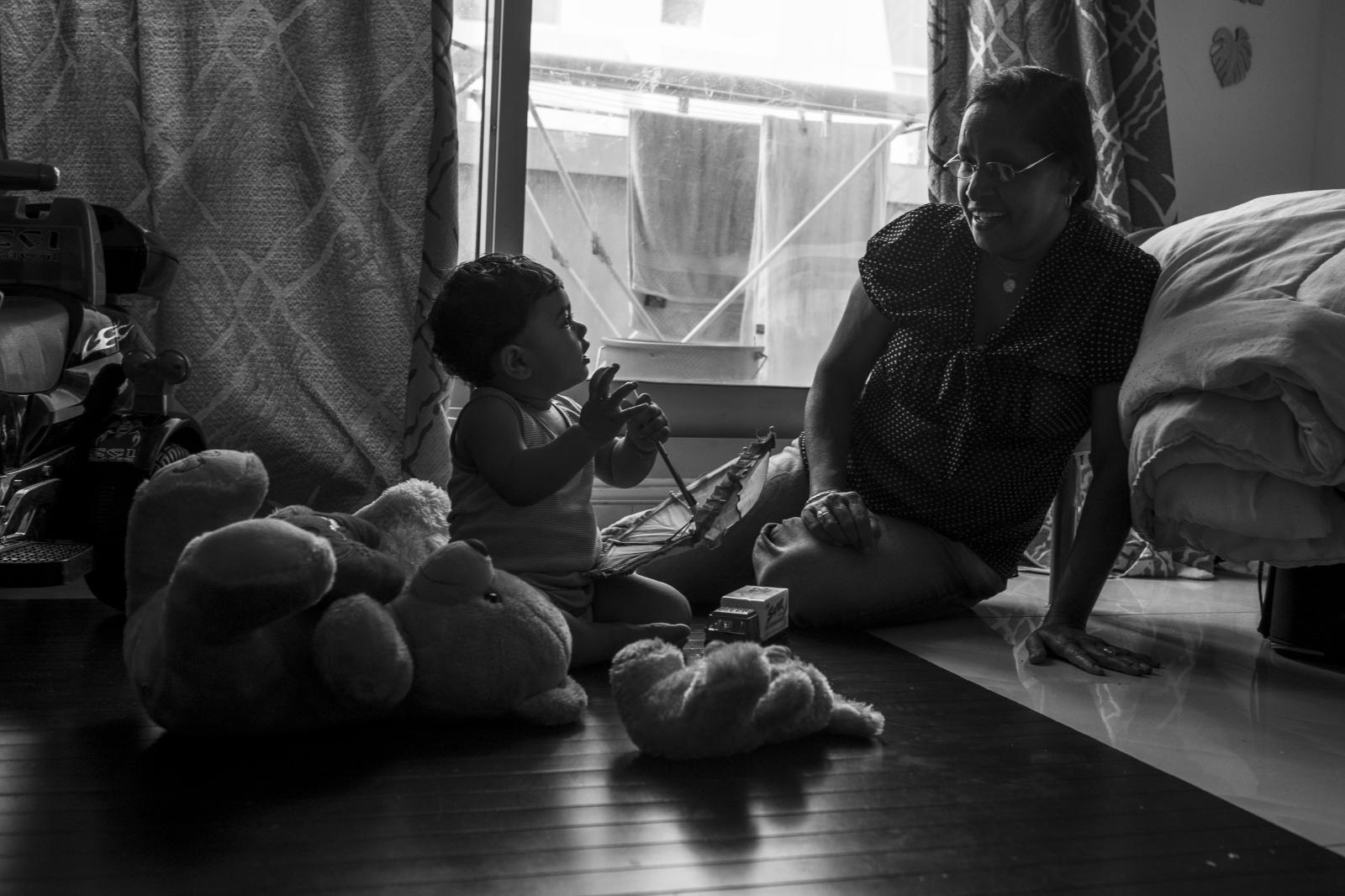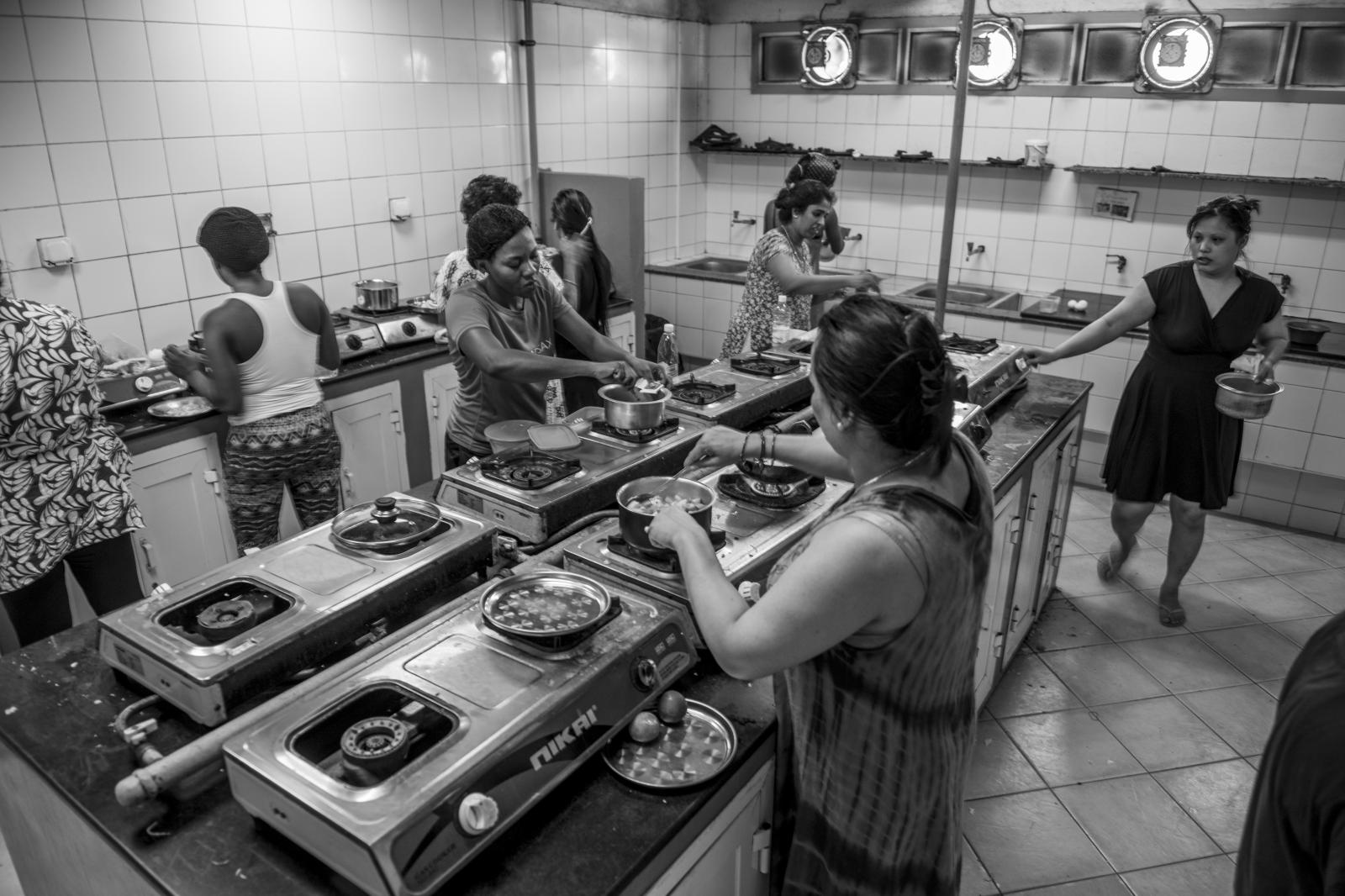Private Story
Sri Lankan Economic Crisis: Women Domestic Workers Migrate to the UAE - Ongoing
With a prayer on her quivering lips, the 28-year-old, who has been working as a nanny for a English family in the UAE capital for over 9 years, reaches for her phone, a lifeline connecting her to the love of her life, her only son, John. The four-hour time difference between Dubai and the Philippines makes it 7.05am in Quezon, Geneylyn’s hometown province where her unemployed husband and John are themselves fighting a battle of survival. “My son has been suffering from a heart problem for the past 10 years — ever since he was born. It’s only for his treatment that I am working here. My husband was forced to give up his meagre-paying job to care of our son. There is no way I could have earned this much money in my country. In any case, that wouldn’t have been enough to manage both the family and to pay for John’s treatment. I speak to my son without fail every day in the morning.”
Huge personal price
This is the depressing state of affairs that plagues Geneylyn and hundreds upon thousands of mothers who have left home and hearth to eke out a living for themselves and their families back home — paying a huge personal price in the bargain. These brave ladies, most of the times with their smiling faces belying the misery and depression that is deep-rooted underneath, are commonly found as employees at supermarkets, beauty salons, tailoring shops, restaurants. These teeming thousands, a majority of whom are employed as domestic workers, toil well over 12-hour shifts, and include nannies, day-care and housekeeping employees. There is a common thread that unites these marginalised sections of the expatriate workforce. These lowly-paid mothers, with little medical cover, day in and day out push themselves to live and work so that their children can be fed and be educated. They are ever-willing to give all and sacrifice all, as they harbour this eternal hope, of one day seeing at the end of their cold, dark tunnel of life bereft of the warmth of dear ones, a light, albeit dim. These ladies are in the truest manner speaking, breadwinners.
Lifelong entrapment Predominantly hailing from the Indian subcontinent and the Philippines, the day-to-day struggles of single mothers employed as domestic workers or lower down in the retail and hospitality chains in the Middle East, lead to lifelong entrapment. Bereft of regular up-close and personal interaction with family members — for years on end — many of them are resigned to lives of depression and trauma, hopelessness, lack of identity and, therefore, lack of confidence.
Finding it increasingly hard to juggle between job and the time invested in communicating with loved ones back home, they develop poor food and eating habits, leading to health issues. Moreover, much to their frustration, many find it difficult to handle the responsibility of establishing a routine for their children who drift into lives lacking discipline and focus. Mothering from afar indeed entails a very big price that these women have to pay. A story that illustrates these anomalies is that of another Philippine native, Relsa. The walls of this working mother’s home are cluttered with photographs of six of her children and grand-daughters in the Philippines — pictures of graduations, birthdays, every important occasion. “They are my world, I love them a lot,” said Relsa, who works in Abu Dhabi as a document controller. Relsa has been more than 14 years away from her six children and two grand-daughters.It is only through social media platforms, that they are able to fill to a certain extent, the void caused by the absence of exchange of intimacy on a daily basis. “I have forever lost 14 long years of my life… no children to hold and cuddle, and now… no grandchildren to play with. I do not know when I finally, will be able to be among my loved ones.”
Small mercies
“Thanks to small mercies like Whatsapp voice chat, Facebook and Messenger, we keep in touch ever so often, but alas, I suppose it was me who had to make this sacrifice for my family to see a brighter tomorrow. For me, their dreams are my dreams, and so, for their tomorrows I am prepared to forfeit my all,” she adds, with tears now flowing down her cheeks. It seems as long as mothers move over to foreign lands in search of greener pastures in jobs that see them perpetually just managing to float above the surface of desperation, the ‘pastures’ they came in search of in the end turn out to be mere mirages in the desert sands.
Role reversal failure
The parental role reversal in the case of women doing low-paid jobs sees the father, or sometimes, other relatives, not being able to provide the emotional support that children normally get from their mothers. Says Geneylyn: “Though the money I send should be enough to meets my family’s needs, a slight overindulgence on my husband’s part results in him not being able to pay attention to John at crucial times. But then, I do understand my husband’s need to have a break from full-time care. What can I do? Leaving the job and returning home is not an option.” The same question dogs Sathya from Visakhapatnam in India, a mother of three, who works as a cleaner for a housekeeping firm in Dubai. After the death of her husband, who succumbed to tuberculosis at 35, Sathya had to shoulder the responsibilities of bringing up her three children all by herself. Being uneducated, she had no choice but to take up the very first offer of a job that came her way, in Dubai. She has been working 8-hour shifts (plus overtime) from the day she landed in the UAE and it has been 6 years now. “My children, aged 11, 9 and 7, all of whom I left in the care of my elderly widowed mother, have had to cope without the care and love that can come only from a mother. “From my monthly earnings of $220, I have to manage my personal expenses relating to food and house rent besides the money that I send back home for the upkeep of my mother and three children.
‘I go back, no one eats’ “Sometimes, as I am cleaning the restroom mirrors at the various locations I’m posted at, I see myself in the squeaking-clean glass. I imagine my children all clinging to me and entreating me to stay back in India. “I could go back anytime I wish to, but I know that if I go back, no one eats,” Sathya says with a soulful sigh, her own misty eyes welling up with tears. “In the end, I comfort myself that it is better that I stay here, sacrifice myself and keep praying for them,” she adds, holding up a handkerchief to her moist eyes. The stories strike similar discordant notes, that of emotional anguish, financial distress and entrapment and, most of all, the unbearable pain of separation. In a normal familial situation, it’s parents who shape their children’s future. Mothering from afar on the other hand, becomes a difficult proposition for both mothers and their children. Their stories of pain arising from being away from their families were very clear; their reasons for moving from their children were even clearer — these mothers couldn’t bear separation like any other mother would, but at the same time they could not bear to see their children go through difficulties they themselves had gone through. Tears flowed freely and emotions bared while bread-earning mothers in the UAE were being photographed for this story. Despite their steely resolve, these courageous women broke down a number of times, and the deep anguish from the sacrificial lives they led, was clearly evident in their melancholic eyes. While they keep working day and night to earn enough money in order to provide their children a better future, the fathers or other relatives, as the case may be, try to step into their shoes. But, given the stressful circumstances, very rarely can substitutes fill the role of the mothers when it comes to love and tender loving care. Social media does fill the communications gap to a small extent. Sharing pictures, voice notes, and sending each other “I care” messages keeps the intimacy alive, despite the ever-existential gulf. But what on earth can take the place of a hug or embrace, the availability of a shoulder to cry on? So, while feelings of remorse, hopelessness, and guilt are part and parcel of working mothers away from their children in far-off lands, for the growing-up kids, separation brings its own share of trauma, loneliness, insecurity and a feeling of utter powerlessness. Alas, if the need never arose for any mother to be separated from her children, we would be living in a normal world. Are we?
61




